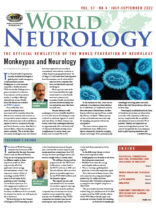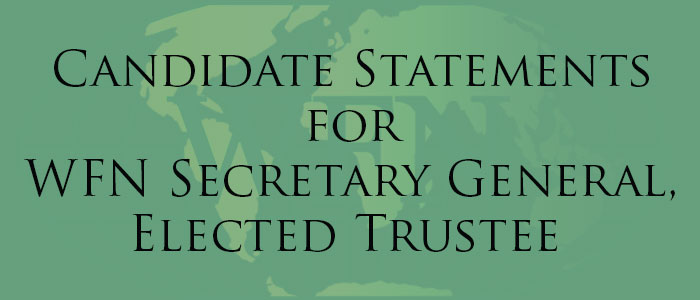
Below are the Candidate Statements for Secretary General and Elected Trustee. Three statements for Secretary General and four statements for Elected Trustee are listed in each category.
The Secretary General Candidate Statements, for the three candidates, in alphabetical order, are from:
- Marianne de Visser
- Steven Lewis
- Tissa Wijeratne
The Elected Trustee Candidate Statements, for the four candidates, in alphabetical order, are from:
- Chandrashekhar Meshram
- Bo Norrving
- Minerva López Ruis
- Mohammad Wasay
![]()
Candidates sorted alphabetically
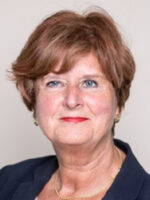
Marianne de Visser
Marianne de Visser
My name is Marianne de Visser. I am an adult neurologist from Amsterdam, The Netherlands, and (emeritus) professor of Neuromuscular Diseases at the University of Amsterdam.
I would like to apply for the position of Secretary General and I am deeply honored that the Nominating Committee recommended me—together with two other candidates—to the Membership.
I have been committed to the good cause of the WFN for several decades. First as a delegate on behalf of the Netherlands Society of Neurology, subsequently as an elected trustee (2002-2008), chair of the Nominating Committee, co-opted trustee (July 2020 through December 2021) and recently President Wolfgang Grisold appointed me as chair of the Membership Committee and vice chair of the WFN Congress Committee. I have witnessed the growth of WFN. The increasing membership, but also the expanding role of the WFN in several impactful initiatives worldwide are clear signs of leadership.
The close collaboration with the WHO has borne fruit for neurology. The then President Johan Aarli coordinated the Atlas Project, resulting in the publication of its first edition in 2004, showing the country resources for neurological disorders. In 2017, the second edition was published, coordinated by past President Raad Shakir and Donna Bergen. The data shows that while the burden of neurological disorders is disproportionately high in low- and middle-income countries, health care services and resources are often scarce.
Another highlight of the collaboration with the WHO is the recent unanimous approval by the WHO Member States of the Intersectoral Global Action Plan on Epilepsy and Other Neurological Disorders. Elected Trustee Alla Guekht and Immediate Past President Bill Carroll together with the Global Neurological Alliance played a significant role in this.
The WFN puts many efforts in fulfilling its mission “Fostering quality neurology and brain health worldwide.” Among others by the launch of the Brain Health Initiative to promote prevention of brain diseases and improving the outcomes of those living with brain diseases. The World Brain Day is an extremely successful recurring event on July 22, this year focusing on “Brain Health for All” conveying five important messages: Awareness, Prevention, Advocacy, Education, and Access.
Several WFN programs focus on education, in particular aimed at residents and early career neurologists. The COVID-19 pandemic was a tragedy in many aspects, but the coronavirus silver lining was the huge uptake of virtual meetings and the implementation of virtual health care. Both developments greatly facilitate access to education and health care.
President Grisold states in his column in World Neurology that the WFN will need to take diversity, equity, and inclusion into consideration in its strategy, that the needs of early career neurologists require specific attention and action, and that a platform for patient organizations should be installed in the WFN infrastructure. I embrace those initiatives, and I am fully committed to serve the WFN as Secretary General to make those initiatives a success in close collaboration with the trustees and the indispensable colleagues from the head office. •
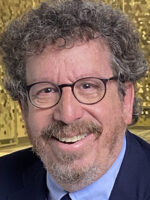
Steven Lewis
Steven Lewis
It has been a privilege serving as WFN acting secretary general since January 2022, elected trustee since 2016, and co-opted trustee prior to that. In these and many other WFN roles, I remain indebted to this organization and the opportunities it has provided me to help achieve the WFN mission.
My involvement with the WFN occurred coincident with my AAN appointment as editor-in-chief of Continuum, where a joint WFN/AAN program provides print and online access to Continuum to neurologists from over 49 neurological societies from low/lower-middle income countries. As a general neurologist, educator, academician, and editor, I have worked tirelessly on this critical resource while continuing to find ways to enhance the program and its access.
In my expanding roles at the WFN, and for which I am available 24 hours a day given our worldwide constituency, I have become integrated into the daily workings of this organization for global neurologic education, training, practice, and advocacy.
As editor of World Neurology for the past seven years, I have the responsibility to report on news about neurology to neurologists worldwide. As chair of the Education Committee, I have the privilege to help create and hone educational opportunities in the form of department visits, fellowships, and full neurologic training, junior travelling fellowships, and many other educational programs and research grants to neurologists/trainees especially from lower- and lower-middle income countries who otherwise wouldn’t be able to access such opportunities. As Teaching Course chair of WCN 2019 (Dubai), 2021 (Rome/virtual), and Congress Committee Chair of WCN 2023 (Montreal), I have led the creation of programs attended by thousands of participants to learn from world-class speakers.
In all my WFN responsibilities, I have the privilege of collaborating with esteemed colleagues from regional and national societies and committees and related organizations, co-trustees, and WFN presidents, and from our talented hard-working staff. The knowledge, expertise, and camaraderie of all has been invaluable in improving my effectiveness to our organization.
If elected as Secretary General, I pledge to continue in this role to help achieve the WFN’s mission via ongoing collaboration with national and regional neurologic societies and organizations (including the WHO in our increasing partnership); grow our regional teaching centers and department visits for neurologic training to expand within and beyond the current regions to include any region where neurologists are underrepresented; leverage virtual opportunities; increase awareness of all WFN opportunities for all neurologists worldwide; and react quickly to novel regional or global neurological threats. I also look forward to completing the initiative President Grisold and I spearheaded to develop and distribute a practical Global Neurologic Core Curriculum addressing the minimal required knowledge, skills, training experiences, and overall competencies of neurologists, while recognizing regional variations in resources, funding, and diseases.
I would be honored to be elected to continue as WFN Secretary General, in which I would continue to work around the clock to faithfully serve our delegates and all neurologists for the mutual goal of improved neurological access and the highest quality of neurology and neurological health worldwide. •
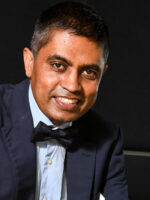
Tissa Wijeratne
Tissa Wijeratne
What an exciting time to be in WFN! It is an incredible honor to have been nominated for the WFN Secretary General election this year. Brain health is in peril globally. One in three of us has a brain disorder. Brain disorders are the leading cause of disability and the second leading cause of death globally. Two-thirds of these occur in low- to middle-income countries. Different regions of high-income countries demonstrate vast disparities in awareness, education, access to care, prevention, and rehabilitation. I have seen this imbalance in care firsthand during my youth in rural Sri Lanka, followed by culturally and linguistically diverse communities representing 166 nations in Western suburbs of Melbourne, Australia. I believe WFN can build on the successes of the last few decades, capitalize on IGAP, and advocate more for quality neurology and better brain health by improving local engagement and activities.
If elected, I will seek to enhance the inclusiveness and constant collaboration already at our society’s heart. We shall continue to work hard to support movers and shakers in brain health worldwide—not only neurologists, academics, and industry but also the billions of patients and families experiencing the effects of brain disorders. Advocacy and supporting local advocates will be a crucial component of my global vision for quality neurology and better brain health. We will continue to assist national societies, health ministers and ministries, aiming to deliver the IGAP for all neurological disorders in all regions during the next decade. Educational programs, grants, symposia, CME, traveling fellowships, accreditation, and postgraduate training programs will all be added to, enhanced or, in some cases, newly developed to help address this need globally. We are already doing a lot, but we can and will do more. Our many activities will continue to bring neurologists worldwide together, ensuring everyone’s voice is heard. Committee representation, additional scientific activities, and other advocacy campaigns shall be the tools we use to achieve this goal.
The WFN needs hard-working men and women who can dedicate themselves to improving brain health worldwide. To cohesively solve the issues facing neurologists across the globe, we can listen to, discuss, and assimilate the ideas of many. I will bring these qualities to our leadership group. As you know, I have already represented the global neurology community in WFN activities for nearly two decades. I am ideally poised to take up the responsibilities of Secretary General, as I bring experience from both sides of the world—from rural Sri Lanka to Australia and beyond. The World Brain Day campaign has already reached out to over one billion people since its genesis in 2014. Yet, there is more ground to cover, but our goals are achievable. With our already talented team, we can work together on this critically important task now.
More about me on my website www.tissawijeratne.net. I am on WhatsApp at +61430048730 if you need to clarify anything with me directly. •
![]()
Candidates sorted alphabetically
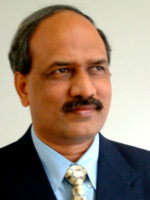
Chandrashekhar Meshram
Chandrashekhar Meshram
I am grateful to the Indian Academy of Neurology and the WFN for considering me worthy for the position of Elected Trustee.
Services to the WFN
I am indebted to WFN for giving me the opportunity to serve as co-opted trustee and as the president of Tropical and Geographical Neurology Specialty Group (TGNSG). In these roles, I have contributed to the mission of WFN “fostering quality neurology and brain health worldwide.” Through TGNSG, I organized 16 webinar sessions on neuro infections and gave opportunity to trainees from different regions of the world to sharpen their clinical skills through interaction with the experts. Our ongoing series “Inspiring People in Neurosciences” is a step in the same direction. All of these sessions are available on the WFN website. TGNSG also provides monthly updates of COVID-19 for the WFN website. I was also instrumental in getting the teaching sessions by Indian Academy of Neurology on the WFN website. I have planned the department visit program in India for residents from poor countries.
I have served on the Constitution and Bylaws Committee as a member for three terms and the WFN Scientific Program Committee for two terms. I took the challenge to resurrect Tropical Neurology SG by successfully organizing the first International Tropical Neurology Conference in 2017 in India. I was then given the responsibility as president of TGNSG. I was co-chair for INTROPICON II held in Brazil. TGNSG now is one of the most vibrant and active SGs of WFN. Because of these activities, I was appointed as a co-editor for the special issue of JNS on Tropical Neurology, section editor of Encyclopedia of Neurosciences for the section on Bacterial and Fungal infections, including Tropical Diseases and assistant editor of eNeurologicalSci.
The World Brain Day is the most eminent public awareness initiative of WFN. The public education campaigns are close to my heart. I have been actively organizing World Brain Day activities, and this year, we have planned 100 such activities in India. I have been the coordinator for the National Brain Week in India for the last 8 years. I have published about 350 articles for public education, including several in World Neurology.
The global burden of neurological diseases is massive, and there is a shortage of neurologists to deal with it. Therefore, I have been organizing educational programs for general physicians and pediatricians.
Goals
There is a glaring inequality in neurology care and education worldwide. The developing and underdeveloped countries lag behind in both these aspects because of lack of resources. WFN is making every attempt to help them catch up, and I am committed to addressing it. We need to focus on the management and long-term care of neurological diseases in these resource crunch settings. Collaboration with WHO and other societies is important for brain health. If elected, I look forward to implementing recently adopted IGAP on Epilepsy and other neurological disorders.
The WFN board of trustees needs representation from developing countries. This need and a passion to work for the WFN are the reasons for standing for the post of an elected trustee. I would be grateful for your support. •
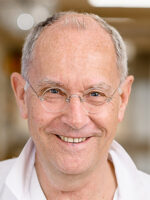
Bo Norrving
Bo Norrving
I am honored by my nomination as candidate for elected trustee of the WFN from the Swedish Neurological Society.
My work as a neurologist spans over several decades. I received my training at Lund University and had several short but very formative post-doc periods at Massachusetts General Hospital/Harvard with Bob Ackermann and C. Miller Fisher. I have authored more than 600 publications, have an h-index of 111, and more than 100,000 citations. I am fully trained in general neurology, but my main focus has been clinical stroke with several seminal contributions that include pioneering clinical trials, clinical-imaging correlations, epidemiology, and development of stroke services
As a young neurologist, I attended my first World Congress in Neurology in Kyoto 1981. This event sparked my interest in the global aspects of neurology, international networking, and engagements in neurological societies. I served as president of the World Stroke Organization (WSO) from 2008 to 2012, and served as an executive till 2020. During my term as president, the WSO underwent a rapid expansion, with several new initiatives, and became closely involved with the WHO and the U.N. placing stroke in the focus on prioritized actions on non-communicable diseases. I participated in several high-level NCD meetings, including the landmark 2011 U.N. general assembly meeting, and I was portraited in Lancet Neurology 2013 as “Bo Norrving: Putting stroke on the world map.” I also had the opportunity to visit a large number of high income as well as low-middle income countries, get insights in stroke and neurology services in very different circumstances, and to establish a very large network.
I chaired the revision work of the cerebrovascular section for the ICD 11 at WHO. I played a key role in the important change to have all cerebrovascular diseases to form a single block under the section of Diseases of the Nervous System, which will have a profound effect on the positioning of stroke in several aspects in the future. I am currently a member of the Strategic and Technical Advisory Group on the Prevention and Control of NCDs (STAG-NCD) at WHO.
I have a longstanding and strong connection with the WFN as well as with regional neurological societies. During my terms as WSO executive, WSO and WFN established several collaborations, including the formation of the Brain Health Alliance. I have served for the WFN Educational, Scientific Program, and Finance Committees. I have been the Swedish delegate at the WFN on several occasions.
The WFN is the only global neurological organization and has an enormous potential to strengthen the position of neurology and improve neurological services. The Brain Health initiative, and the WHO Intersectorial Action Plan on Epilepsy and Other Neurological Disorders provide unique possibilities to make a change but will require hard work and advocacy skills. If elected as a WFN trustee, I will bring on my long experience in working with strategic development, governmental bodies, and advocacy in neurology. I am hard working and prestige free. Serving the WFN as an elected trustee would be a privilege. •
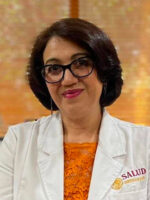
Minerva López Ruis
Minerva López Ruis
I am Minerva López Ruiz, MD, and I have applied as a candidate for trustee of the WFN.
Among my relevant data, I am past president of the Mexican Academy of Neurology (MAN), current secretary of the Mexican Board of Neurology, representative for Latin America of the MAN, undergraduate professor at the medical schools of the Anahuac University and the Autonomous University of Mexico, as well as postgraduate professor at the General Hospital of Mexico (the largest public hospital in Mexico).
Within my activities in the WFN, I highlight that, in 2016, being president of the MAN and Dr. Raad Shakir being president of the WFN, it was my turn to organize and finance (getting support and sponsorships), the Pan-American Congress of Neurology. An event that I consider very successful, not only because of the more than 1,200 attendees and 149 speakers, but also because it allowed the re-foundation of PAFNS, by sponsoring the attendance of the Latin American representatives so that, during its assembly, they could achieve the necessary participation and votes to approve its new bylaws. Also, during that meeting, the logo was designed, and when it was approved, it was given to PAFNS as a gift and is still used today.
But I do not want this communication to focus on what I have done and my commitment to the WFN, but rather on my proposals to achieve growth of the WFN in the world, especially in Latin America, which I believe is a region where we still have little influence.
To achieve this goal, we have to consider that Spanish is spoken by more than 450 million people in the world (the majority in Latin America), being according to most statistics the second most spoken language in the world. That is why one of my proposals is that the educational material published by the WFN should also have a Spanish version.
A priority for me is education. I believe that we have a great area of opportunity to positively influence the dissemination of educational material, both for neurologists (specialists and trainees) as well as the general population. I will also propose, if elected, the realization of online, interactive clinical-pathological sessions, with the participation of the different neurological training centers, and transmitted to the entire Spanish-speaking world.
Another area of opportunity is, with the support of the neurological societies of each country, to develop diverse educational messages on neurological diseases, aimed at the general population, messages that address issues in which the stigma that marginalizes patients still prevails, for example, epilepsy in women (pregnancy, breastfeeding, etc.). Promoting these topics will bring the WFN closer to the neurological societies, to the societies with their population, but above all, it will benefit the patients.
For all the above, I would like to ask for your vote in the next WFN elections, with the promise that, if elected as trustee, I will work on these proposals and all those that you suggest to me and to which I am open to listen. •
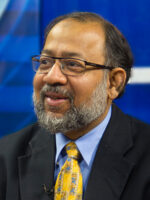
Mohammad Wasay
Mohammad Wasay
I am currently Alicharan endowed professor of neurology at Aga Khan University Karachi, past president—Pakistan Society of Neurology and Pakistan stroke Society, president, Neurology Awareness and Research Foundation, Editor—Pakistan Journal of Neurological Sciences, Chief Editor—Jahan e Aasab (Neurology public awareness magazine), and Distinguished scholar COMSTECH (OIC). I have also served as a director of World Stroke Organization (WSO) and currently serving as Fellow of Pakistan Academy of Medical Sciences and Pakistan Academy of Sciences and Secretary of the Environmental Neurology speciality group (ENSG) of WFN.
I have worked with WFN for more than a decade as an active neurology advocate and researcher from South Asia. I was trained at Palatucci Forum and then received Advocacy Leader of the Year Award by American Academy of Neurology for my global advocacy contributions. I served as chair of theWFN Advocacy Committee for four years. This committee was instrumental in starting and organizing World Brain Day activities and promoting brain health across the globe. We organized many advocacy workshops during the Asian Oceanian Association of Neurology Conferences, Asian Pacific Stroke Conference, and World Congress of Neurology.
We are working at Aga Khan University to establish a network of neurology training and research in Kenya, Tanzania, Afghanistan, and Central Asia. We established the Asian Stroke Network with more than 20 centers in 10 Asian countries. This network has published many multicenter and multinational studies related to stroke in young and Asian women, stroke in pregnancy, and cerebral venous thrombosis in Asia. Currently, I am leading an initiative to establish OIC neurology academy to promote neurological care and training in developing Islamic countries. Recently, I have been appointed chair, specialty groups committee, by the WFN president.
I have trained more than 48 neurologists under my supervision. I have published more than 200 papers in peer-reviewed medical journals with impressive publications metrics (IF: 576; citations=5300, H- index 33 and I10 index 85) for a clinical neurologist in a developing third-world country. I have received many awards, including the Teachers Recognition Award by American Academy of Neurology, Gold Medal by Pakistan Academy of Medical Sciences, Gold Medal by Pakistan Academy of Sciences and Research Productivity Awards by Pakistan Council of Science and Technology. I have received 27 research and training grants (intramural and extra mural) as PI and co-PI. I have been an invited speaker at more than 120 conferences in 73 countries.
The growing burden of neurological diseases in the world has established WFN as an important stakeholder in global health. WHO has recently approved an intersectoral action plan for promotion of neurological care, training, and advocacy across the globe. We plan to promote brain health as a top agenda for WHO and United Nations. There is an inequity in neurology training and care across globe. South Asia, Central Asia, and Africa should be a center point for our future interventions. As a trustee, I could play a valuable role in promoting both agendas. Our advocacy committee and ENSG could play an important role in establishing WFN as a key player in global health. •
